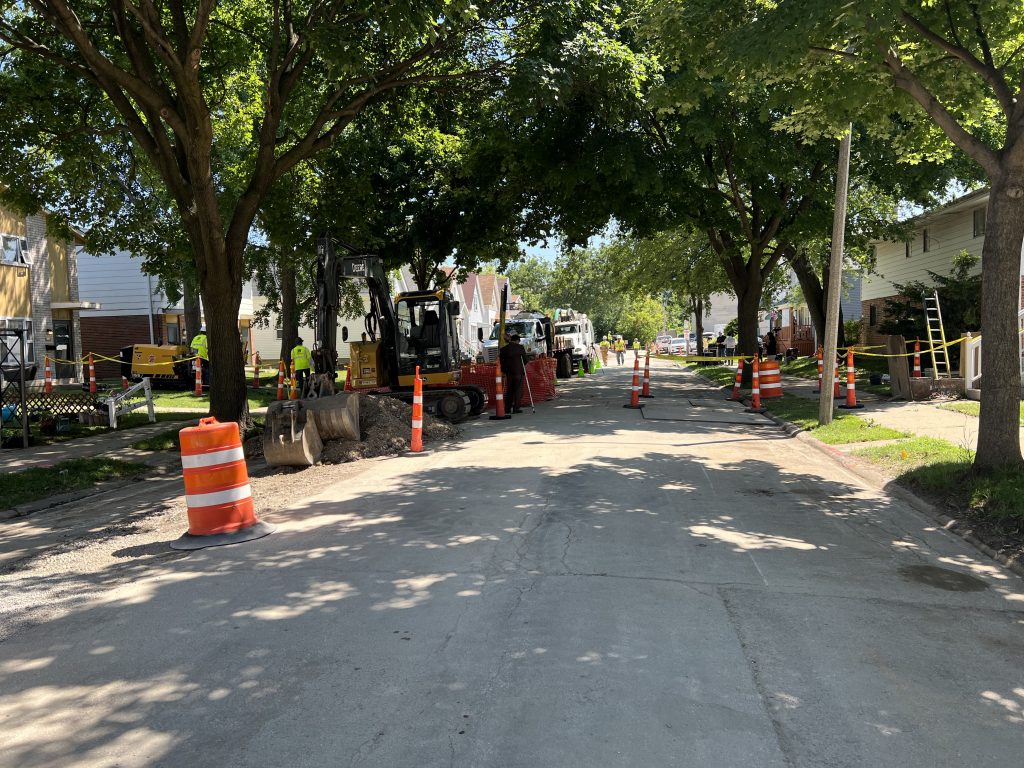Milwaukee Now Requires More Notice When Contractors Dig Up Streets
Prior practice was "terrible" says Bay View alderwoman.
Alderwoman Marina Dimitrijevic and the Department of Public Works (DPW) hope to make it less surprising when private contractors start digging up your street.
On Wednesday, the Common Council unanimously voted to substantially increase notice requirements for contractors performing excavation work on city streets.
The prior ordinance required a paper notice be issued to abutting property owners two days in advance of excavation work, such as installing a fiber optic line or replacing a sewer line, if the was to take more than four days.
“That isn’t going very well,” said Dimitrijevic in briefing the Public Works Committee on May 17. Referencing a recent sewer project near her Bay View home, she said she received no notice on what the work was, when it would start or when it would end. “The communication was terrible.”
The council has now changed the requirement to a three-day notice if the work lasts more than one day. An amendment also added a penalty, of $25 to $250, for failure to comply with the notice requirements.
The fine was added at the suggestion of Alderman Russell W. Stamper, II who said the notices aren’t being lost, they’re never being delivered.
The notice now must include the type of work to be performed, expected duration and the name and telephone number of someone directly responsible for and knowledgeable of the project.
Contractors must take photos or record a video of delivering the notices. “Like Amazon style,” said Dimitrijevic.
“We think it’s a big improvement,” said the alderwoman.
“What most contractors do is put a notice directly on that person’s door,” said DPW coordination manager James Washington. He said others use letters with delivery confirmation. Certified mail, said Washington, is too expensive given the scale of some projects.
“It feels like there is a lot less accountability in these private contracts. And these are multi-million dollar citywide contracts. I think these contractors can do better in communicating,” said the alderwoman.
“This is good,” said Ald. Robert Bauman.
Ald. Jonathan Brostoff said he welcomed the change, so he didn’t need to attempt to figure out what the work was and then try to distribute the information. “I’ve just been taking that into my own hands, because if my constituents don’t get that notice they get upset, and they should get upset,” said Brostoff.
The private contractors receive permits, which include requirements on noticing neighbors and other practices, from DPW.
From the council floor Wednesday, Dimtrijevic added Stamper, Bauman, Scott Spiker, José G. Pérez, Khalif Rainey, JoCasta Zamarripa, Mark Borkowski, Larresa Taylor and Lamont Westmoreland as cosponsors. “I have gotten major complaints about the lack of notice and disregard,” said Pérez.
Dimitrijevic credited DPW for helping identify ways to improve the process.
Legislation Link - Urban Milwaukee members see direct links to legislation mentioned in this article. Join today
If you think stories like this are important, become a member of Urban Milwaukee and help support real, independent journalism. Plus you get some cool added benefits.
Political Contributions Tracker
Displaying political contributions between people mentioned in this story. Learn more.
- December 13, 2018 - José G. Pérez received $50 from Mark Borkowski
- May 5, 2015 - José G. Pérez received $100 from JoCasta Zamarripa
City Hall
-
Council Blocked In Fight To Oversee Top City Officials
 Dec 16th, 2025 by Jeramey Jannene
Dec 16th, 2025 by Jeramey Jannene
-
Latest Effort to Adopt New Milwaukee Flag Going Nowhere
 Dec 3rd, 2025 by Jeramey Jannene
Dec 3rd, 2025 by Jeramey Jannene
-
After Deadly May Fire, Milwaukee Adds New Safety Requirements
 Dec 2nd, 2025 by Jeramey Jannene
Dec 2nd, 2025 by Jeramey Jannene
Transportation
-
Congestion Pricing Cuts Air Pollution in New York City
 Dec 14th, 2025 by Jeff Wood
Dec 14th, 2025 by Jeff Wood
-
FTA Tells Milwaukee to Crack Down on Fare Evasion — Even Where Fares Don’t Exist
 Dec 12th, 2025 by Graham Kilmer
Dec 12th, 2025 by Graham Kilmer
-
Will GOGO’s Bus Service Ever Get Going?
 Dec 9th, 2025 by Jeramey Jannene
Dec 9th, 2025 by Jeramey Jannene






















What about the quality and material of street patches by contractors? I frequently see good condition concrete streets cut open by contractors and the hole filled with low-quality asphalt that eventually turns into a pothole. How do we hold contractors accountable to patching in a quality manner?